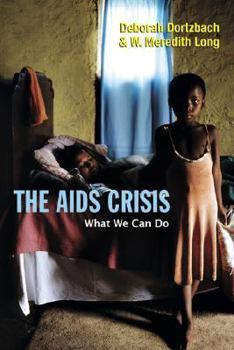The AIDS Crisis: What We Can Do
Over forty million people today are living with HIV/AIDS. In 2005, three million people died of AIDS, and half a million of them were children. The reality is dark. But in darkness, even one small flame of light makes a difference. And the church of Jesus Christ is bringing light into the darkness of the AIDS crisis all over the world. Like these churches, this book is a flame. Deborah Dortzbach and Meredith Long offer personal stories, up-to-date statistics and their years of international experience to give us the global portrait of AIDS: the roots of the problem and the role of the church. They teach us to listen. They allow us to observe. They help us become informed so that we can become involved, partnering with brothers and sisters already at work around the world loving, lobbying, caring, praying. "The light shines in the darkness, and the darkness has not overcome it" (Jn 1:5). Here is a book to help us see how the light of Christ shining through his church can change the course of the current AIDS crisis. Market/Audience Ministry organizations Missionaries Laypeople concerned about the AIDS crisis Pastors Features and Benefits Gives a global perspective by national and international experts. Gives a biblical perspective. Provides the basic facts we need to know in a brief format. Provides a great orientation for anyone interested in AIDS. Offers concrete ideas for taking action.
Format:Paperback
Language:English
ISBN:0830833722
ISBN13:9780830833726
Release Date:November 2006
Publisher:IVP Books
Length:157 Pages
Weight:0.48 lbs.
Dimensions:8.0" x 0.5" x 5.3"
Customer Reviews
2 ratings
A Call to Difficult Engagement
Published by Thriftbooks.com User , 18 years ago
The AIDS Crisis: What We Can Do is an excellent and unique resource for a Christian who wants to understand AIDS and respond to the devastation it is causing worldwide. The authors of The AIDS Crisis are not researchers, but practitioners. They have been involved in the heartbreaking, messy, and often frustrating work of responding to (and preventing) AIDS since the early days of the epidemic. Their many years of experience and reflection add a richness and authenticity (and sometimes painful honesty) to their writing. Throughout this book, the authors attempt to communicate the magnitude of the worldwide AIDS disaster, as well as the complexities involved in prevention and care, both through up-to-date statistics and stories. They make it clear that the present issue is not whether we (as Western Christians) should respond, but how and where. They teach us that AIDS ministry is more of a journey than a project. They challenge us to listen, build relationships, and share the burden with those who are already involved in AIDS ministry, before we leap to the task of designing programs and strategies. I was sometimes surprised, reading this book, at how frank the authors were in their discussion of the various issues involved in preventing AIDS transmission among various high risk groups. As Christians, the authors are honest about their struggles to balance grace and holiness in their efforts to prevent the spread of HIV and provide sanctuary to those infected. They admit that through their struggles over the past two decades, they have been transformed in ways they had not anticipated (p. 48). Depending on your background, you may be surprised or disturbed by their conclusions. In my opinion, however, this book's challenge to Christians to engage with people or viewpoints they do not agree with, as they work together to address the AIDS crisis, is one of its greatest strengths. Another strength of The AIDS Crisis is its interaction with Scripture. Through its retelling of the stories of the woman caught in adultery (from John), and the moral failings of David and his sons, it addresses the interaction of grace and holiness, as well the violence (on different levels) caused by sexual sin (reflected in the AIDS epidemic). The authors challenge us to look inward as well as outward, examining our own views and practices concerning AIDS, sex, sin, and forgiveness. The AIDS Crisis clearly calls us, the readers, to respond to the crisis. To help us, there are excellent personal reflection questions and action steps at the end of each chapter, as well as group discussion questions at the end of the book. The authors do not promise that our engagement will be easy, or even personally rewarding (in the way we often define rewarding). Instead, they make it clear that involvement in AIDS ministry will involve personal distress and suffering. "AIDS ministry is painful, it is long, and it has few tangible rewards (p. 133)." Only through dw
Compelling Strories--Vulnerable Writing--Important Read
Published by Thriftbooks.com User , 18 years ago
This book gives a personal approach to the overwhelming issues of AIDS. The authors are vulnerable; the personal stories are compelling. The book does not aim for easy answers to hard questions, but approaches hard questions with compassion and personal experience. (In particular, I found the retelling of Jesus' interaction with the 'woman caught in adultery' stunning.) This book is important for all readers, no matter what their stances on AIDS treatment and prevention. The book educates, yes, but more importantly, it moves its readers to do what Jesus would have done: it moves us to the see the faces, to hear the stories, to listen, and then to act in compassion. It is not "those poor people out there" who are affected by this disease--it is our sisters and brothers.





